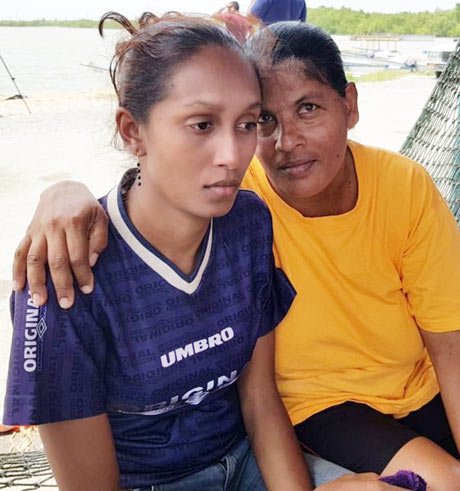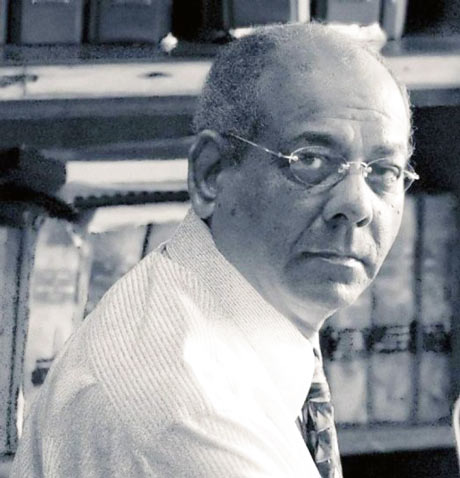
Port-of-Spain – Father of murdered fisherman, Hemraj ‘Alex’ Sooknanan, sat in sombre vigil at the Orange Valley Fishing Depot for eight days, praying for his son’s return from the ocean. Finally, following his devotion, Harry Sooknanan said Ganga Mata and Lord Hanuman returned the body of his dead son, the decomposing remains of the 19-year-old washing ashore more than a week after his untimely death.
A devout Hindu, Sooknanan said his son’s murder broke his heart. The young man perished at sea, along with six other fishermen, victims at the hands of cold-blooded killers, the pirates forcing ten men out of their fishing vessels into the water, then stealing the pirogues and engines. Three fishermen survived the Gulf of Paria ordeal by swimming over two kilometres to land, but seven of the men drowned; so far, five bodies have been recovered, and the search was called off last week with hope lost the missing two men will ever be found.
A grieving Sooknanan said he can only move forward now that his son is dead by spending the rest of his life in religious devotion. He was thankful his prayers were answered for the return of his son’s body, and for closure, having laid his child to rest.
Sooknanan said while he always followed the teachings of Hinduism, his son’s death convinced him God was real after his prayers were answered following the eight day vigil.
Said Sooknanan: “My son make me believe God is real. I does pray to Hanuman Baba and Lord Shiva. I pray and told them, ‘If you can’t give me back my son, it have no God for me again in this world’. I sit down by the waterfront and beg them for my son: Ganga Mata, Hanuman, and Lord Shiva. I tell myself, ‘If they don’t give me back my son, it have no God for me again. I don’t want to hear about no prayers again’. You see they give me back my son?”
So far the sea has returned the body of Sooknanan’s son, along with the bodies of Anand Rampersad, Brandon Kissoon, Leslie de Boulet, and Shiva Ramdeo. Two other fishermen, Justin Kissoon and Trevor Baptiste are still missing.
His dead son was the sixth of seven siblings, Sooknanan said.
“He was a child could never find a ‘No’ to tell anybody; anything you ask him to do he couldn’t find ‘No’ to tell you,” the mournful father said.
Sooknanan remains angry, as he is inconsolable, when his thoughts turn to the killers who so callously took his son’s life, categorical and insistent he does not even want to lay eyes on the murderers.
Said Sooknanan: “The kind of things will go through my mind – I don’t even want to think about it. God will deal with them. The law will take its course. You see those seven innocent lives they take? You done rob them already; they could have tied up all of them and put them in one boat.”
With his voice breaking, the distraught father said: “It is little children you kill outside there.”
The officiating priest at the funeral service for Shiva Ramdeo was also the godfather of the drowned fisherman. Presiding at the July 28 service, Pundit Narine Persad was present when Ramdeo’s body arrived at the house of mourning. He witnessed the collapse of Ramdeo’s mother, Nazeema, when the hearse arrived, and listened to the dead man’s father, Deochan, screaming in agony; inconsolable relatives, in paroxysms of anguish, were being physically restrained by compassionate mourners.
Ramdeo would have celebrated his 28th birthday this Sunday, August 11. Pundit Persad described his godson as a kind and caring man, someone with a great love for the sea.
Said Pundit Persad: “[He was] very vibrant, full of zest for life, and so he passed away very young in his life… Sad to say that when he was in the prime of his life, and while doing his job, his life was lost.”
Pundit Persad did not hold back his grief and anger at the heinous murders the perpetrators had committed, noting, “There is no feeling now for a brethren, a human life discarded. Life now means little, or nothing. The people out there now – are what you call beasts in human form. They are roaming, and they are ready to strike as they did... This shows us the nature of our lives now, and the nature of our country.”
He appealed to the authorities to find the killers, and to bring them to justice.
“There is too much blood flowing in this country… I trust, hope, and pray that somehow the perpetrators, those performing these types of actions, will be apprehended very, very shortly.”
The following day, the dead fisherman Ramdeo’s mother, Nazeema, was present at the funeral of her son’s colleague, Brandon Kissoon. Her role now was a mother in mourning supporting another torn apart by the similar, untimely loss of a child. The murders of their children created a network of support, each parent suffering the tragic loss of a child reaching out to another with compassion, solace, and torrential tears.
Thus it was that Nazeema was in attendance at Kissoon’s funeral, clasping the dead fisherman’s mother despite struggling with her personal, painful loss, reaching out as the mother wailed uncontrollably before collapsing next to the casket. Kissoon’s mother, Runa Ali, did not cease her screaming at the sight of her son’s inaccessible body in its closed casket. She begged to see her son’s face for the last time, pounding on the box, wailing and calling out his name, while moaning for the apprehension of his killers and for justice. A framed photograph was the only image the lamenting mother could see of her murdered child.
Many of Ramdeo’s relatives were also near collapsing, and had to be physically supported. One mourner cried out: “This is not your story, Brandon! This is not how your story is supposed to end.”
Officiating at the service, Pundit Ravi Maraj did not hold back his grief, anger, his anxiety at how unsafe the country had become, and how little the government of Trinidad and Tobago has done to curb crime.
Said Maraj: “One of the most difficult things for any parent is to perform [funeral] rites for their child. No one knows how difficult it is until it reaches home. I urge you to look out for one another, and be your neighbour’s keeper.”
He added: “We cannot expect the government to help us… This incident has shattered Trinidad. Our lives have become very difficult. We need to stop wasting time with those parliamentarians, and have our own meetings at home with our family. We need to sit with our families and talk about security measures.”
The feeling of neglect and abandonment felt by the villagers was not helped following comments made by Member of Parliament for Laventille West, Fitzgerald Hinds. According to reports, Hinds said if the families, or members of the families had called, then there would have been personal intervention by the National Security Minister, Stuart Young, following the attack on the fishermen.
During the five funerals darkening central Trinidad for that entire week in July, villagers were expressing resentment and disbelief, saying, “We got no support. We called the Coast Guard, but they said they had no gas for the helicopter.”
with no polls by Sept 18?
Georgetown – The “ship of Guyana sails into unchartered constitutional waters and nobody knows just what will happen” should general elections not be held by September 18.”
There’s no escaping the sense of foreboding conveyed by these words uttered by political commentator and former Speaker of the National Assembly, Ralph Ramkarran, while speaking at an American Chamber of Commerce in Guyana (AmCham) event on Monday evening at the Marriott Hotel.
The meeting was organised to address the implications of the consequential orders of the Caribbean Court of Justice (CCJ) on business in Guyana. The CCJ, on June 18, upheld the motion of no confidence against the APNU+AFC government and in its consequential orders of July 12 it said that the provisions of the constitution mandating general elections in 90 days from June 18 were in effect.
September 18 would be three months from that June 18 date cited by Ramkarran. Constitutionally, the date for elections can only be extended with the approval of two thirds of the National Assembly. But the opposition PPP has said it would not be returning to parliament to facilitate an extension. The PPP has argued that general elections should have been held by March 21st this year and that the government has dragged out the process and violated the constitution.
Three panelists – Attorney General Basil Williams, former Attorney General Anil Nandlall and Ramkarran – made presentations at the AmCham event giving their opinions on what happens next.
In his initial presentation Ramkarran argued that post September 18, nobody knows just what will happen and that Guyana will be in great economic and political jeopardy leading to instability.

Nandlall supported Ramkarran’s assertions arguing that after September 18 there will be constitutional illegality as well as economic and social problems.
“We are on a precipice, after September 18, you will have a government that does not enjoy constitutionality and that is a state of anarchy. It will not be able to protect citizenry generally and business specifically. We are at a crossroads,” he stated, while declaring that he was “sick and tired” of having to deal with the issue.
Williams however argued that the ability of the business community to do business with government will not be impaired.
“The nature of the business which members of the Private Sector engage in with government is of a commercial nature. Any commercial transaction; routine commercial transactions are unaffected. We could still tender for certain contracts. Those are routine matters so there is nothing impairing your ability to enter into a commercial contract with government,” he argued while reiterating that government is prepared to stand for elections on any date named by the elections commission.
Nandlall countered that routine contracts cannot build an economy. “Routine contracts are just that routine. You cannot enter into contract that matters which are those which come from multilateral institutions,” he stressed.
Observers have noted that even the legality of contracts presided over by the National Procurement and Tender Administration Board after September 18 can be called into question.
While the panellists spent the majority of their time presenting different political positions on the no confidence motion and it impact, the audience continued to bring the focus back to more basic issues.
“I’ve heard a whole lot of jargon that I’ve been listening to for the last couple of months in reference to political agendas but there has been nothing specifically outlined about what happens in this business environment. I’ve yet to hear specific facts about impact on the economy. I need you to go step by step for an idiot like me and say what is the projected effect on the economy,” businesswoman Dawn Stuart stated.
In response, Williams stressed there will be no impact while the other panellists posited that the impact would be detrimental.
One foreign investor and political risk analyst stressed that despite political rancor what he and his clients are most interested in is a clear consensus on how issues such as the appalling state of infrastructure, lack of electricity and continued disparity between the rich and poor will be addressed.
“Can you provide assurances to investors that there is a national vision, a way forward, plans that both parties are committed to which address these problems?” he asked.
None of the panellists could give him this assurance.
“Yes, those issues are important but the foundation of a legitimate government must be there first,” Nandlall argued.
On June 18 the CCJ ruled that the December 21 no confidence motion was properly passed and that the provisions of Article 106 which calls for elections within three months had been activated. Nearly two months later an election date has not been named and members of the business community have become increasingly concerned about the possible economic impact of another stalemate.


